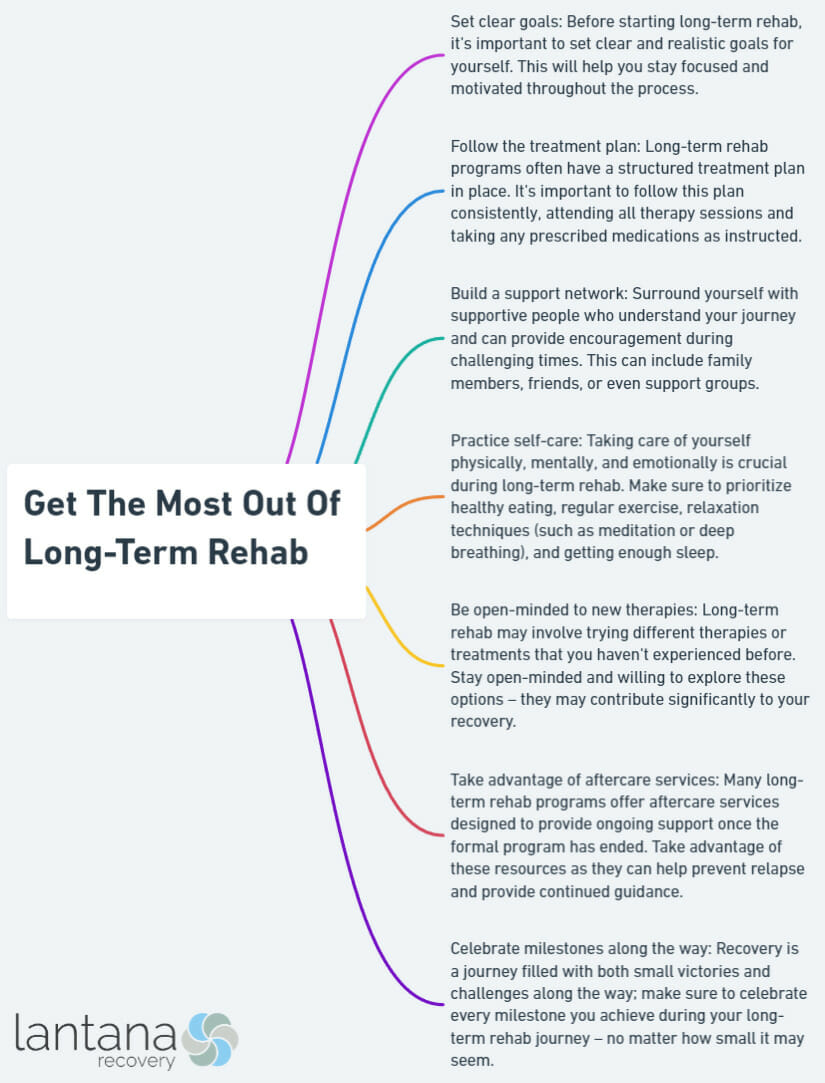Overcoming drug and alcohol addiction is a challenging journey, but choosing the right treatment program is crucial for achieving long-term recovery. Long-term rehab programs, designed to address the complex nature of addiction, have been proven effective in promoting lasting sobriety. In this blog post, we’ll explore the importance of long-term rehab, the different types of programs available, and the essential components that contribute to their success. We’ll also provide guidance on choosing the right program based on individual needs, financial considerations, and the crucial role of aftercare in maintaining sobriety.
Key Takeaways
- Long-term rehab is essential for treating substance use disorders, as it has been shown to lead to increased abstinence and improved quality of life.
- It involves the integration of individual and group counseling, family therapy, medication management, support groups & 12 step programs with ongoing therapy & counseling in order to foster lasting recovery.
- Choosing the right long term program requires assessment of addiction severity along with financial considerations such as insurance coverage or alternative payment options.
The Importance of Long-Term Rehab

The Substance Abuse and Mental Health Services Administration (SAMHSA) underscores the value of long-term rehab for substance abuse treatment, particularly in cases of severe substance use disorders and as a provision for mental health treatment.
Research published in Psychiatry Journal indicates that extended periods of long-term treatment are associated with more positive outcomes, such as increased abstinence and improved ability to lead productive lives.
Mental Health Services Administration Perspective
SAMHSA’s perspective on long-term rehab highlights its effectiveness in helping individuals with severe addiction issues, as well as addressing co-occurring mental health disorders.
Incorporating recovery support services into this comprehensive treatment approach is fundamental for individuals grappling with addiction and mental health issues.
Addressing Co-Occurring Disorders
Long-term rehab programs often cater to individuals with dual diagnoses, or those who are struggling with both substance use disorders and mental health issues. These dual-diagnosis programs provide comprehensive assistance and treatment, addressing both disorders simultaneously to achieve the most beneficial results.
Long-term residential treatment is particularly beneficial for individuals with co-occurring disorders, as it allows ample time to address and process the complex factors contributing to their addiction.
Types of Long-Term Rehab Programs

Various long-term rehab programs cater to the unique needs of individuals seeking treatment for addiction. The available treatment program options include therapeutic communities, residential treatment, and inpatient care.
Comprehending the differential benefits of each type can empower individuals to make informed choices when selecting the most suitable program for their recovery journey.
Therapeutic Communities
Therapeutic communities are long-term rehab programs designed to promote personal accountability, responsibility, and the development of socially productive lives. These programs typically last between 6 to 12 months and focus on comprehensive lifestyle changes to ensure a successful life without substance abuse after treatment.
The National Institute on Drug Abuse states that therapeutic communities are an efficient treatment for individuals with specific needs. Such needs include:
- Adolescents
- Women
- Homeless people
- Those suffering from mental health problems
- Those with criminal justice challenges
Residential Treatment
Residential treatment is another option for individuals seeking long-term rehab. In this setting, patients live at a licensed rehab center, receiving intensive therapy and 24-hour supervision within a non-hospital environment.
The structured environment and variety of services provided in residential treatment allow for a more comprehensive approach to address the root causes of addiction and promote lasting recovery.
Inpatient Care
Inpatient treatment offers an even more intensive and organized setting, with 24-hour access to medical and mental health professionals, as well as various therapeutic activities and support groups.
By addressing the root causes of addiction within a controlled environment, inpatient care for alcohol addiction can help individuals maintain sobriety and prevent relapse more effectively than outpatient care.
Components of Successful Long-Term Rehab Programs

Successful long-term rehab programs incorporate various components to ensure comprehensive and effective treatment. Some of the key elements that contribute to the success of these programs include individual and group counseling, family therapy, and medication management.
Addressing the intricate nature of addiction and providing bespoke support, these components synergize to promote enduring recovery.
Individual and Group Counseling
Individual and group counseling sessions play a critical role in long-term rehab programs. These sessions help address:
- Addiction severity
- Employment stability
- Criminal justice involvement
- Educational level
- Socioeconomic status
among other factors.
Through evidence-based therapies and a supportive environment, individual and group counseling can facilitate the development of coping skills, provide insight into addiction, and teach how to manage triggers and cravings.
Family Therapy

Family therapy is another essential component of long-term rehab programs. It can contribute to the success of an individual’s recovery journey by:
- Understanding the dynamics of the family
- Cultivating healthy communication skills
- Recognizing and addressing underlying issues
- Formulating a plan for ongoing support
Family therapy at a drug rehabilitation center can help to create a safe and supportive environment for the individual in recovery, as well as provide an opportunity for group therapy sessions to enhance the healing process.
Medication Management
Medication management is an integral aspect of long-term rehab treatment, helping to manage withdrawal symptoms and reduce the likelihood of relapse. In these programs, medical professionals assess the necessity for medication, monitor the effects, and provide instruction regarding the utilization of medication.
This careful oversight ensures that patients receive the most effective and safe treatment possible.
Choosing the Right Long-Term Rehab Program
Selecting the most suitable long-term rehab program is a crucial step in the recovery process. To make an informed decision, individuals should consider the following factors:
- Treatment approach
- Evidence-based care
- Individualized treatment
- Accommodations and preferences
- Supportive environment
- Family involvement
- Aftercare services
Considering these factors will help ensure that individuals choose a rehab program that best meets their needs and increases their chances of successful recovery.
Evaluating these factors enables individuals to choose a program that best aligns with their unique needs, preferences, and circumstances.
Assessing Addiction Severity
Evaluating the severity of one’s addiction is a critical step in determining the appropriate long-term rehab program. By assessing addiction severity through tools like the Addiction Severity Index (ASI), individuals can identify the level of treatment required to address their unique needs and challenges.
Considering Local Resources and Support Networks
Local resources and support networks play a significant role in the success of long-term rehab treatment. Having access to resources such as 12-step programs, counseling, and other social services can provide additional support and direction during the recovery process.
“Positive outcomes such as self-efficacy and healthy coping have been associated with AA affiliation, which has been linked to better outcomes,” reports a study exploring the benefits of 12-step programs for alcohol addiction recovery. (Benefits of peer support groups in the treatment of addiction, Tracy, Wallace, 2016)
Researching and connecting with local resources can help individuals maintain focus and dedication to their recovery goals.
Evaluating Program Accreditation and Staff Credentials
Selecting a reputable, accredited program staffed with qualified personnel is paramount to guarantee the highest standards of care and treatment. When assessing program accreditation and staff qualifications, individuals should investigate the program’s accreditation status and staff credentials to guarantee they are experienced, qualified, and capable of providing effective care and treatment.
Financial Considerations for Long-Term Rehab

The financial implications of long-term rehab can pose a significant concern for many individuals seeking treatment. Gaining a clear understanding of insurance coverage and alternative payment options is key to secure access to required treatment and care.
It is important to research the various insurance plans available and understand the coverage they provide.
Insurance Coverage for Long-Term Rehab
While health insurance typically covers long-term drug and alcohol rehabilitation, it’s vital to verify the coverage and take into account factors such as the provider’s coverage limits, the required treatment type, and the cost of treatment.
Contacting the insurance provider or treatment center can help individuals understand their coverage and available options.
Alternative Payment Options
For those without insurance coverage or needing additional financial assistance, alternative payment options are available. These options may include:
- Personal loans from friends or family members
- Financing options or loans
- Paying out of pocket
- Medicaid or Medicare coverage
Researching and considering these options can help individuals access the treatment they need without facing overwhelming financial burdens.
The Role of Aftercare in Long-Term Recovery

Aftercare plays a pivotal role in sustaining sobriety and warding off relapse after completing long-term rehab. By engaging in support groups, 12-step programs, and ongoing therapy and counseling, individuals can continue to receive the support and guidance needed to maintain their recovery goals.
For more information, read our article on What is rehab like to understand how a rehab works for drugs and alcohol dependence.
Support Groups and 12-Step Programs
Participation in support groups and 12-step programs, such as Alcoholics Anonymous and Narcotics Anonymous, can provide a sense of community and support for those in recovery. These groups encourage accountability and offer a safe space to discuss challenges and achievements, ultimately contributing to long-term sobriety and success.
Ongoing Therapy and Counseling
Maintaining therapy and counseling sessions after completing a long-term rehab program is vital for mental well-being, enhancing self-awareness, and fostering healthier coping strategies.
By engaging in ongoing therapy, individuals can strengthen their support system, create healthier relationships, and remain focused on their recovery goals.

Summary
In conclusion, long-term rehab programs provide a comprehensive and effective approach to treating drug and alcohol addiction. By understanding the importance of long-term rehab, exploring various program types, and considering essential program components, individuals can make informed decisions about their treatment options. Financial considerations and aftercare also play crucial roles in ensuring access to treatment and maintaining long-term recovery. By embracing the support of qualified professionals, local resources, and ongoing therapy, individuals can achieve lasting sobriety and reclaim control of their lives.
Frequently Asked Questions
What are the advantages of long-term rehabilitation?
Long-term residential rehabilitation encourages positive lifestyle changes, providing guidance and assistance for improved self-care habits like exercise, journaling and meal planning.
This helps individuals develop healthier habits which can have lasting positive impacts on their wellbeing.
What is the rehab phase of recovery?
The rehab phase of recovery is a four-step process including controlling pain and swelling, improving range of motion and flexibility, strengthening muscles, and doing proprioception and balance training.
Is it ever too late for rehab?
It is never too late for rehab. No matter the age, alcohol and drug rehab can still provide individuals with a chance of recovery and substance-free living.
What is the difference between therapeutic communities and residential treatment?
Therapeutic communities emphasize personal growth and accountability, while residential treatment provides intensive therapy and 24-hour supervision.
How long do long-term rehab programs typically last?
Long-term rehab programs typically last between 6 to 12 months.
These programs are designed to help individuals overcome addiction and develop the skills needed to lead a healthy and productive life. They provide a safe and supportive environment for individuals.









